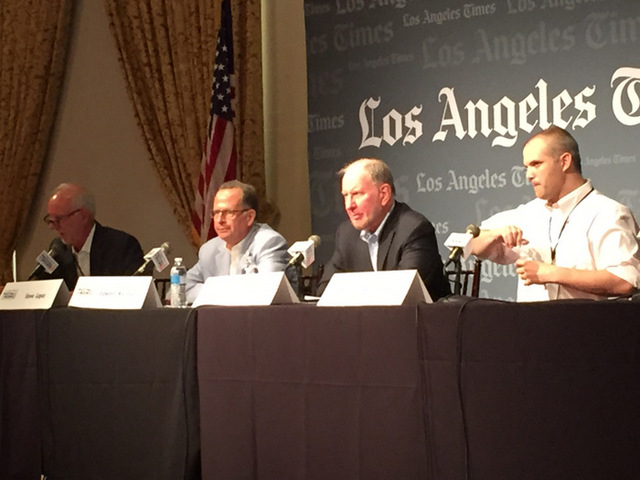It’s the spending, stupid!
LOS ANGELES — If Robert Putnam gets his way, the wealth and opportunity gap will be the No. 1 issue of the 2016 election.
Speaking at the 2015 Los Angeles Times Festival of Books, Putnam said the research he did for his book, Our Kids: The American Dream in Crisis, shows chances for success in life are tied more to where and how one grows up than to other factors.
And that, he says, is outrageous. “It is fundamentally un-American, that the family into which you’re born so totally determines your future,” Putnam said, comparing the system to the apartheid of South Africa and saying Americans are increasingly living segregated by class.
Although he studied the wealth gap in schools, Putnam said schools don’t cause the gap, as much as reveal it. If you go to school with kids who are well-off, you tend to do better, academically and otherwise. If you go to school with kids who struggle in poverty and the negative social consequences that follow, you tend to do worse.
“We’re increasingly living in enclaves,” Putnam said. He said a single street in his hometown of Port Clinton, Ohio, features a zero percent poverty rate in a neighborhood of lakefront homes, compared with a 50 percent poverty rate on the other side.
Can it be fixed? Fellow panelist Edward Kleinbard, author of We Are Better Than This: How Government Should Spend Our Money, said yes.
“It is as politically feasible as we choose to make it,” he said.
Kleinbard argues in his book not for a big increase in taxes on the more well-off, which liberals have long advocated, but for more targeted spending along with modest tax increases on higher-income earners, say, a return to levels seen during Bill Clinton’s administration.
Like FDR, Kleinbard said he thinks the government has a role in enabling upward mobility, but it’s been starved of that ability by anti-tax Republicans who espouse the philosophy that government is too big, and must be brought down to size by tax cuts.
“All we need to do is spend more,” he said.
But that spending should be done in an incremental way, he said. (Kleinbard said a 10 percent increase from current levels should do it.) Increases in the gasoline tax, eliminating the cap on taxes for Social Security, lowering the threshold for the top tax bracket to $250,000 and cutting back on personal itemized deductions should do the rest, he argued.
And, Putnam added, a return to the idea that kids are everybody’s responsibility — the “it takes a village” philosophy once espoused by Democratic presidential candidate Hillary Clinton — is necessary, too. Investing in public education has to be seen as an investment in ourselves and the country’s future.
“In the end, I’m not trying to make America, Sweden,” Putnam said. “I’m trying to make America, America.”
Kleinbard took issue with what he called “market triumphalists,” people who share the idea that economic market results are good because they’re created by the market. He said that the same Adam Smith so frequently cited by conservatives for his economic views also said that no society can flourish when the greater part of society is poor.
But when asked by an audience member about the potential presidential candidacy of Bernie Sanders, the independent Vermont senator who’s running on a progressive platform of attacking the wealth gap with a robust system of tax increases and infrastructure-repairing programs, Putnam and Kleinbard both agreed: a Sanders campaign has no chance.
That means either one of two things: Either regular Americans don’t care enough (or can’t be made to care enough) about a wealth and opportunity gap to make an effective campaign issue, the opposite of what Putnam wants, or that they’re hoping mainstream candidates address themselves to the issue.
So far, however, while Clinton and some of the declared Republican candidates have mentioned the wealth gap, only Sanders has delved very deeply into its causes and effects. (For more on that, see previous blogs here and here.)






















